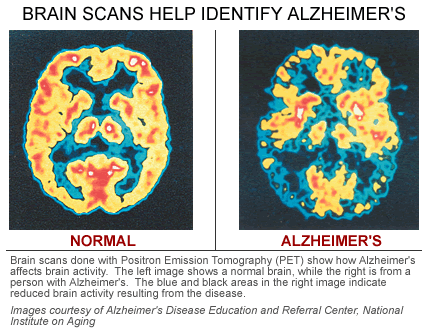Is it possible to pin-point Alzheimer’s disease? The answer, I’m afraid, is no. In fact, the only way a person can truly be diagnosed with the disease is during an autopsy. So how can we better target the potential that a person actually has Alzheimer’s? The picture below shows what a PET scan can show in terms of the brain’s activity. Even though this is still not the perfect way to determine if a person has Alzheimer’s, it is a definite manner by which a neurologist can determine if a medication can be used to help maintain helathy brain activity.
So what are some of the advancements being made today in the study, treatment, and preention of Alzheimer’s and dementia? The following article was published in the Summer issue of Inspire Magazine. Written by Dr. Peter Lichtenberg of Wayne State Univeristy, it offers a glimpse into what advances are being made on this topic.
+ + +
Understanding Risk Factors for Alzheimer’s Disease and New Approaches to Care
by Peter A. Lichtenberg, Ph.D., ABPP, Director, Institute of GerontologyProfessor of Psychology at Wayne State University
Alzheimer’s disease has become a household word, affecting over five million Americans and feared by millions more. The MetLife Foundation reported in a 2006 study that after cancer, Alzheimer’s is the second most feared disease among both middle-aged and older Americans. Despite its prevalence and the increasing attention to it by the public and healthcare professionals, Alzheimer’s disease remains a difficult disease for families and general health practitioners to recognize and treat.
In 2006, the Michigan Dementia Coalition conducted a statewide behavioral surveillance survey about memory loss. One of the survey’s most striking results was the lack of public awareness about where to get help for Alzheimer’s disease. The majority of those surveyed (60%) said they would seek help from their family doctor. The next most popular response was searching the Internet for information (10%). Sadly, only 1% had heard of the Alzheimer’s Association or would contact them for information, indicating a large gap between the public’s fear of Alzheimer’s disease and their actual knowledge about it and its treatment. (more…)
